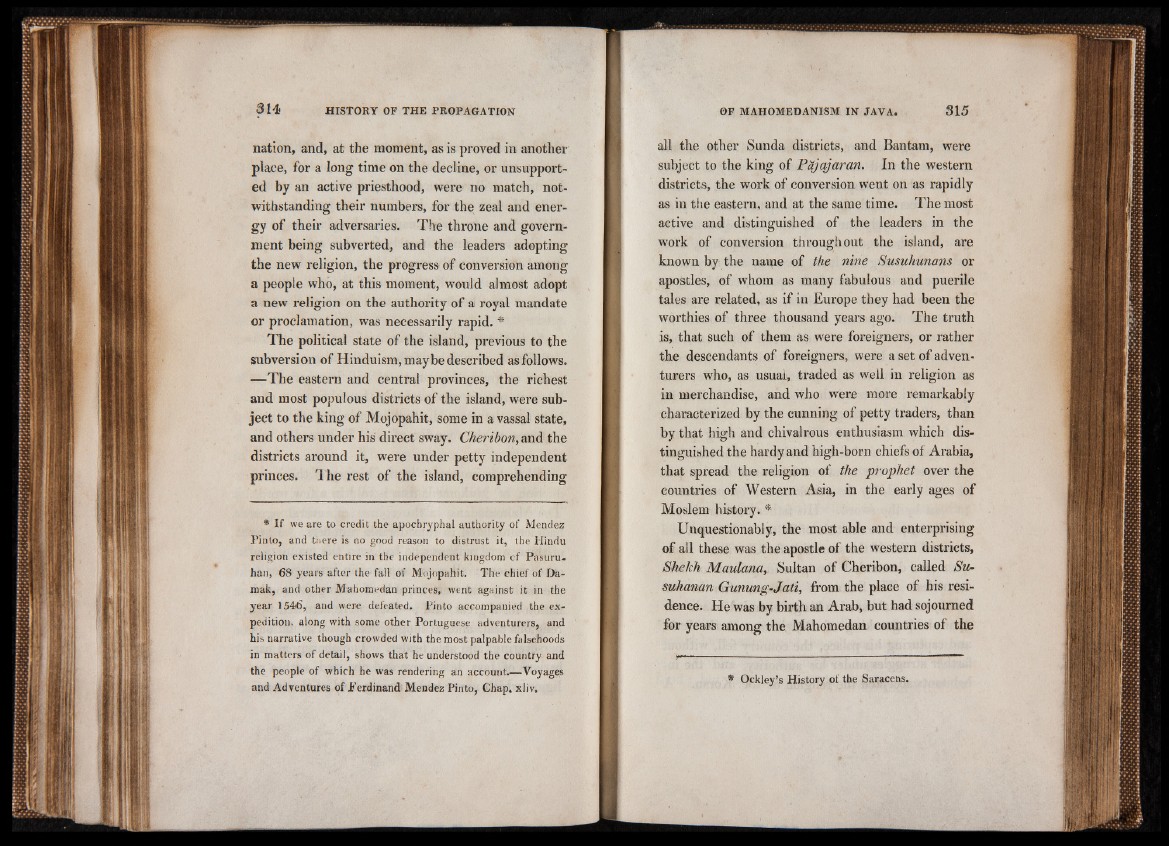
nation, and, at the moment, as is proved in another
place, for a long time on the decline, or unsupported
by an active priesthood, were no match, notwithstanding
their numbers, for the zeal and energy
of their adversaries. The throne and government
being subverted, and the leaders adopting
the new religion, the progress of conversion among
a people who, at this moment, would almost adopt
a new religion on the authority of a royal mandate
or proclamation, was necessarily rapid. *
The political state of the island, previous to the
subversion of Hinduism, maybe described as follows.
—The eastern and central provinces, the richest
and most populous districts of the island, were subject
to the king of Mojopahit, some in a vassal state,
and others under his direct sway. Cheribon, and the
districts around it, were under petty independent
princes. The rest of the island, comprehending
* If we are to credit the apochryphal authority of Mendez
Pinto, and there is no good reason to distrust it, the Hindu
religion existed entire in the independent kingdom ef Pasuru-
han, 68 years after the fall of Mojopahit. The chief of Da-
mak, and other Mahomedan princes, went against it in the
year 154b, and were defeated. Pinto accompanied the expedition,
along with some other Portuguese adventurers, and
his narrative though crowded with the most palpable falsehoods
in matters of detail, shows that he understood the country and
the people of which he was rendering an account.—Voyages
and Adventures of Ferdinand Mendez Pinto, Ghap. xiiv.
all the other Sunda districts, and Bantam, were
subject to the king of Pajajaran. In the western
districts, the work of conversion went on as rapidly
as in the eastern, and at the same time. The most
active and distinguished of the leaders in the
work of conversion throughout the island, are
known by the name of the nine Susuhunans or
apostles, of whom as many fabulous and puerile
tales are related, as if in Europe they had been the
worthies of three thousand years ago. The truth
is, that such of them as were foreigners, or rather
the descendants of foreigners, were a set of adventurers
who, as usual, traded as well in religion as
in merchandise, and who were more remarkably
characterized by the cunning of petty traders, than
by that high and chivalrous enthusiasm which distinguished
the hardy and high-born chiefs of Arabia,
that spread the religion of the prophet over the
countries of Western Asia, in the early ages of
Moslem history. *
Unquestionably, the most able and enterprising
of all these was the apostle of the western districts,
Shekh Maulana, Sultan of Cheribon, called Su-
suhanan Gunung-Jati, from the place of his residence.
He was by birth an Arab, but had sojourned
for years among the Mahomedan countries of the
* Ockley’s History of the Saracens.